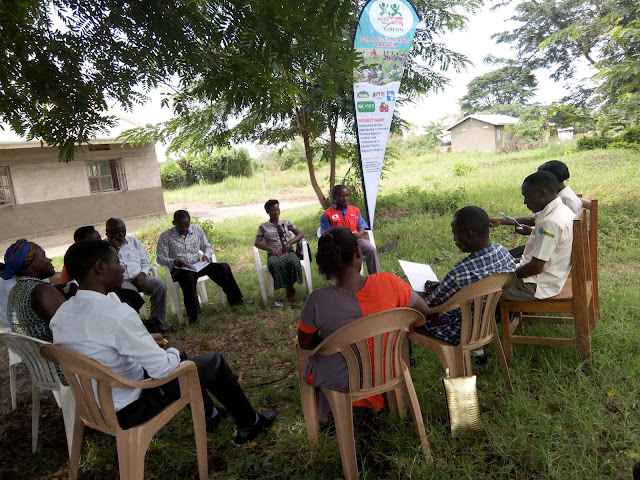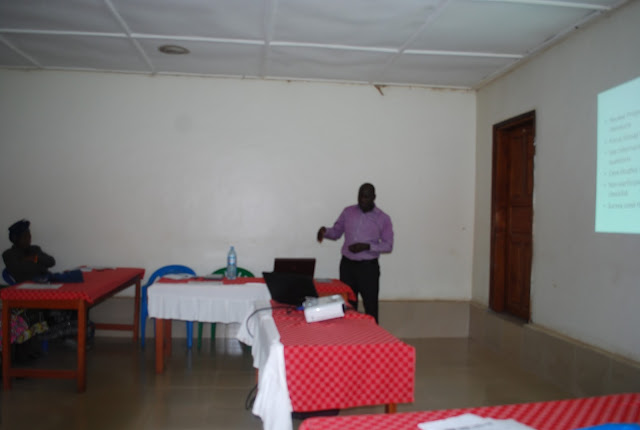Good Hope foundation has continued to use the model
couple approach in preventing violence against children and adolescents in
families. The organization identified and is working with nine (9) model
couples from the two sub counties of Kisinga and Karusandara who are working as
change agents in prevention of violence against children at family through
influencing the parenting practices, beliefs and norms. This has been possible
through organizing home visits to the most vulnerable families that expose
violence against children to share with them experiences on positive parenting
practices and advising them on how best they can enhance children’s parenting
mainly by creating safe families where children can grow and realize their full
potentials. Every couple reaches to ten (10) most vulnerable families that
expose violence against children and adolescents.
On 7th and 8th August 2017, at
Kisinga and Karusandara sub bounty headquarters, Good Hope Foundation organized
a refresh training session for the nine (9 )model couples in the two sub
counties of kisinga and Karusandara who were refreshed on the concept of
violence against children and adolescents and the parenting practices. The
refresh training session was for the purposes of refreshing the model couples on practical skills of positive
parenting practices and creating a platform for the model couples to come
together and share experiences on how they are managing to change and influence
the parenting practices, beliefs and norms on child upbringing among their ten
families
for learning purposes. Members had to challenges they are facing during the
home visitation exercise and forging ways on how to overcome the challenges.
During the refresher
session, the model couples where taken through the concept of parenting with
main focus on child upbringing. Key areas of discussion included; the
definition of child upbringing, types of parenting such as; traditional, modern
and integrated parenting, the right practices of upbringing children (positive
child upbringing practices), the negative child practices as well as the
challenges in children upbringing today
 |
| model couples being refreshed on positive parenting practices |
While sharing experiences, the model couples
highlighted some of the key findings and some challenges they are facing in
their home visitation exercise to share experiences on parenting. Key findings
included; families are faced with severe hunger, poverty vulnerability among
the families, high cases of domestic violence among the households visited, the
visited families are also characterized with alcoholism tendencies and law
education levels.
Model couples also had to share experiences on the
current situation since they started having sharing visits with the selected
households on child upbringing and prevention of violence against children and
adolescents.
As Senga Imana Fidel a model
couple in Karusandara subcounty shared with us during the experience sharing
meeting that “at first during my first visit to the family of Murugahara Paul
of Kivengenyi village Karusandara sub county when I had a meeting with the
family members, one child told me that his father beats him a lot and then I
shared with the family on how it’s not good to beat children as it affects the
child’s growth and mental abilities, I discussed with him some alternative
methods of correcting and punishing children including giving them educative
work appropriate to their age. After the discussion, the parents admitted to
have been using beating as the only form of punishing and they said they will
adopt and start using other methods of punishing children. When I went back
children shared with me that they are no longer being beaten by the parents and
parents thanked me for sharing with them the different methods of punishing
children and that the alternative punishments even work well than the beating.
After giving them the punishment, they even go ahead to explain to them why
they have given them such punishment. This makes children to love their parents
and also to easily change their characters”.
 |
| model couples sharing experiences on positive parenting |
At first before I visited the
family of Idi of Kabaka village Karusandara sub county, they used to share
their room with the children, I shared with the parents on the effect of
parents sharing room with their children especially on how it increases the
risk of children to be violated sexually and the risk of children to engage in
harmful acts as they try imitate the parent’s actions. At the end of the
sharing, we agreed with the family to have their rooms separated from that of
the children, when I went back for follow up I found out that children no
longer share the same room with their parents and this has reduced violence
against children and reducing their risk to be violated and engaging in harmful
acts. Reported by Dizimana Emmanuel a model couple
As david Kaheru a modal couple in
Kisinga shared with the members during the sharing meeting that one family of
Mr. Alex Mugisha a native of Rwnaguhya-Kisinga town council which i visited,
there was an issue where female children were not taken to school and that the
parents had become demoralized on parenting of their children because of the
bad characters of their children. The parents shared with me that regardless of
their efforts to ensure that children attain school and grow as responsible
children, 3 of their girls have been impregnated at early age when in school, 2
of their children also are at home with children and this demoralized the
parents from continuing educating other female children. So as a model couple I
shared with the family members that sometime we fail because of lack of
corporation with the children and that there is need to treat all children
equally and that to solve all these issues in their family they should create
love to their children and to always involve their children in family’s
meetings and listen to their views such that they can be in position to detect
what children pass through and what they are likely to face when its early. I
shared with them that the past should not demoralize them and that them
producing does not mean it’s the end of their future they can still return in
school and complete it. I advised them to continue fulfilling their duty and
responsibility towards all children. I
was happy when I went back for another visit, the parents had realized the
value of having meetings with their children, and the value of educating all
children. They had had one family meeting already, the two children who had
dropped out of school have been enrolled again in school one of 13 years at
kisinga vocation and the other of 10 years at kisinga primary school and they
now show love to their children.
 |
| sharing success stories from the family outreaches |












